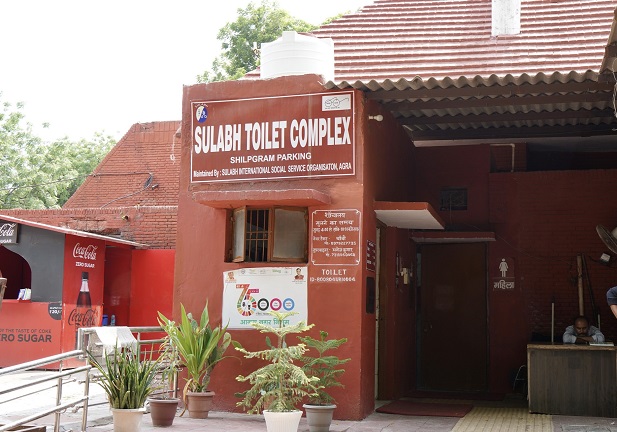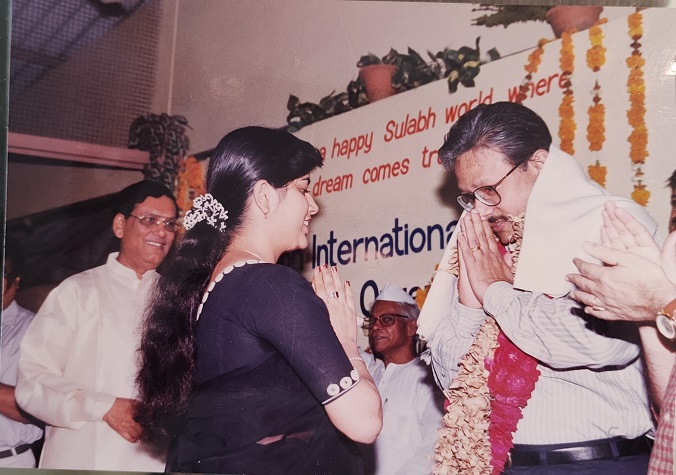Last Updated on August 22, 2023 1:22 pm by INDIAN AWAAZ
Obituary
Pathak stood as a beacon of hope for countless individuals across India. His pioneering efforts in the realm of sanitation not only enhanced public health but also empowered marginalized communities, particularly those of the scavenger caste, by providing dignified livelihood opportunities.
By AJ Philip

Embarking on my first solo train journey as an adult, I headed to Visakhapatnam to visit my uncle. Despite sending a telegram about my trip, I arrived at the station without anyone to greet me. His address was linked to a restaurant in the city. Upon reaching the restaurant, I discovered that it would open only at 8 am, leaving me with three hours to spare and a pressing need to freshen up.

I attempted to use a nearby public toilet, only to be met with its appalling state. In desperation, I opted for a hotel room at Rs 8 per day, where I quickly bathed and then set out for the restaurant. coincidentally, I encountered my uncle along the way, as he had just received my telegram and was searching for me. The thought crossed my mind that if a clean, affordable toilet were available, I wouldn’t have had to spend Rs 8—a significant sum for an unemployed person like me at the time. This same idea ignited the passion of another individual who would go on to pioneer a movement. This individual was Bindeshwar Pathak, a visionary leader and the founder of Sulabh International. His recent passing occurred after he delivered the Independence Day message from his headquarters at Mahavir Enclave, New Delhi. Born in 1942, Pathak dedicated his life to improving sanitation and uplifting countless lives in India. His remarkable contributions have left an indelible mark on society, and his legacy will continue to inspire future generations. During the 1980s, I had the privilege of crossing paths with Pathak through our shared typist, Kapoor, during my tenure at The Searchlight. It was at this time that Sulabh Shauchyalaya came into existence. Kapoor worked as a part-time typist for Pathak, working until 10:55 am before coming to our office at 11 am. My need for his assistance was limited, save for the days when our editorial page featured public grievances. Kapoor often dozed off in our office, and I would only disturb his sleep when his snoring became too loud. After 5 pm, he would head back to Sulabh to continue typing until 8 to 10 pm. I used to jest with Kapoor that although he worked for Sulabh, he was employed by The Searchlight.

It was during this time that I became acquainted with the incredible work being done by Pathak. I distinctly remember writing a cover story on him in the Malayala Manorama Sunday Supplement, focusing on his groundbreaking concept of “pay-five-paisa toilets” with photographs taken by Ashok KaranThese affordable and accessible toilets proved to be a game-changer, especially in areas like Gandhi Maidan, which had become a public toilet due to the lack of proper facilities. The city had approximately one lakh rickshaw-pullers who lacked access to toilets. For five paise, they were guaranteed a clean toilet, water, and a bit of soap powder for handwashing.
For 10 paise, they could even take a bath. Pathak’s efforts to clean up Gandhi Maidan were not only a testament to his commitment to sanitation but also a reflection of his deep respect for Mahatma Gandhi’s teachings and principles. His organization expanded, and he employed former chief secretaries of the Bihar government as his second-in-command. When I moved to Delhi in 1990, I had the honor of being the chief guest at Sulabh International’s Gandhi Jayanti celebration at their Delhi office. I was fascinated by the toilet museum there and its vast collection of toilets from around the world. One toilet produced musical sounds when sat upon, masking other less pleasant noises. However, what intrigued me the most was a painting from Paris that depicted a couple disposing of human excreta from their balcony onto the road below. Pedestrians on the street were shown trying to dodge the falling waste. It’s no surprise that readers of the American newsweekly TIME voted the toilet as the greatest invention of the second millennium, surpassing electricity, computers, cameras, and more.
This visit provided me with firsthand insight into the impact of Pathak’s tireless work. Beyond his professional achievements, he was a man of immense compassion and a true friend. His presence at my son’s wedding in Delhi remains a cherished memory, a testament to the warmth and bond we shared. His participation in such a joyous occasion showcased his genuine care for others and his ability to form lasting connections with individuals from all walks of life. I was pleasantly surprised to find my son’s article on sanitation featured in a book published by Sulabh. Pathak even donated a motorcycle as the first prize for a lottery organized by the Karol Bagh Mar Thoma Church for its West Delhi project while I was its secretary. Without a doubt, Pathak stood as a beacon of hope for countless individuals across India. His pioneering efforts in the realm of sanitation not only enhanced public health but also empowered marginalized communities, particularly those of the scavenger caste, by providing dignified livelihood opportunities.

Through Sulabh International, he championed social justice and advocated for the rights and well-being of those often overlooked by society, though he did face criticism for not addressing the liberation of scavengers from their roles. Additionally, the organization was led by the privileged while Dalits were tasked with toilet servicing. The appointment of Usha Chaumar, a lower-caste person from Rajasthan, as the President of Sulabh International, was his fitting reply to the critics.
For good measure, she also earned a Padma award. Pathak’s visionary leadership and unwavering determination garnered widespread recognition and honors throughout his lifetime. He received numerous accolades, including the Stockholm Water Prize, the Indira Gandhi Paryavaran Puraskar, and the Padma Bhushan, one of India’s highest civilian awards. These awards stand as a testament to his monumental contributions and the profound impact he made on transforming countless lives. As we bid farewell to an extraordinary man, let us remember Bindeshwar Pathak for his steadfast commitment to humanitarian causes. His legacy will continue to inspire and guide us as we work towards creating a fairer, more inclusive society. Let us carry forward his noble vision of a cleaner, healthier, and more dignified world for all.
